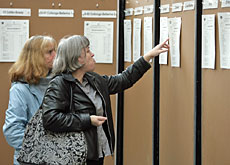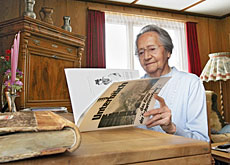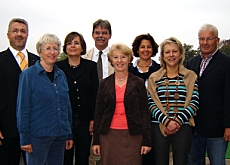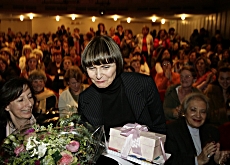Women take political control of Geneva

Geneva has become the first city in Switzerland to have a parliament where women are in the majority.
The result has been hailed as a major breakthrough for women in the world of Swiss politics – traditionally a male preserve. Women only got the vote nationwide in 1971.
“This event is of symbolic importance. That’s to say it’s the first time the 50 per cent threshold has been broken and parity has been achieved,” Thanh-Huyen Ballmer-Cao, a political scientist at Geneva University, told swissinfo.
“The result will resonate throughout Switzerland and internationally. But it is not automatic that it will have an effect elsewhere in the country.”
Following Sunday’s local elections, women now occupy 45 of the 80 seats – a massive increase on the previous legislature when there were only 29 women parliamentarians.
Of the seven parties in the city parliament, five are now represented by a majority of women. Unsurprisingly the left leads the way: ten of the 17 Social Democrats and ten of the 15 Greens elected on Sunday are women.
But they also occupy more than half the seats held by two of the more traditional centre-right parties, the Liberals and the Christian Democrats.
And while men remain in the majority among the centre-right Radicals and the rightwing Swiss People’s Party, women still grabbed a number of seats.
Pressure paying off
Fabienne Bugnon, head of Geneva’s equal opportunity office, said Sunday’s result was proof that the drive for more women in politics was finally beginning to bear fruit.
She said it was especially pleasing to see that it was no longer just the left-of-centre parties that were submitting women candidates.
“The Liberal and Christian Democrat lists were led by women and other women were elected in their wake,” she said.
Ballmer-Cao echoed this, saying the real surprise was not the passing of the 50 per cent threshold but the distribution of women among all parties and the “beginning of a feminisation of the right”.
“There was not the usual imbalance between left and right. For the first time the Liberals and the People’s Party elected an appreciable number of women,” said the Geneva University professor.
But whether the shock result in Geneva marks a sea change in the male-dominated world of Swiss politics waits to be seen.
Lack of interest
A study published earlier this year showed that despite the increase in the number of women being elected to political posts, women are less interested in politics than men.
Women account for around a third of the seats in the local parliaments of Zurich, Basel and Lausanne; they fare slightly better in the capital, Bern, making up 43 per cent of the assembly.
On a federal level, only two of the seven-strong cabinet are women: Foreign Minister Micheline Calmy-Rey, who comes from Geneva, and Economics Minister Doris Leuthard.
And in contrast with other European countries, the gap between the number of Swiss men and the number of women casting votes is widening. In the 2003 federal elections only 38 per cent of women voted.
But Ballmer-Cao feels the general sense of disenchantment with politicians and politics in general provides a golden opportunity for more women to break through.
“I think there’s a strong tendency in Switzerland and in the world towards a more balanced representation between the sexes. The current political climate is helping because there is a crisis of confidence among the population, which has had enough of traditional politics. They want something new – like more women representatives, for example.”
swissinfo, Adam Beaumont in Geneva
Although Switzerland is one of the oldest democracies in the world, it was the last one in Europe – apart from Liechtenstein – to give women the vote.
Women have only been allowed to participate in federal elections since 1971 and it was not until 1981 that equal rights for men and women were enshrined in the constitution. The first woman to hold the rotating Swiss presidency was Ruth Dreifuss in 1999.
During the 2003 cabinet elections one of the two women members, Ruth Metzler, was not re-elected. Failure to replace her with another woman led to protest demonstrations.
53% registered Swiss voters are women.
52 women (26%) have seats in the House of Representatives.
The Senate counts 11 women members (24%).

In compliance with the JTI standards
More: SWI swissinfo.ch certified by the Journalism Trust Initiative



You can find an overview of ongoing debates with our journalists here. Please join us!
If you want to start a conversation about a topic raised in this article or want to report factual errors, email us at english@swissinfo.ch.